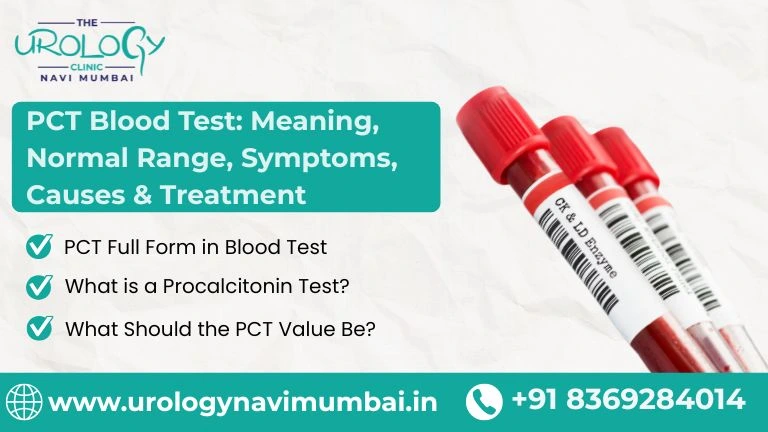PCT Blood Test: Meaning, Normal Range, Symptoms, Causes & Treatment Book An Apppointment When doctors want to find out whether a patient has a serious bacterial infection, they often suggest a PCT blood test. PCT stands for Procalcitonin, a protein that is normally present in very small amounts in the body. However, when there is a bacterial infection-especially a severe one-the amount of PCT in the blood rises quickly. This test helps doctors in many ways: It shows whether an infection is mild or life-threatening. It helps decide if antibiotics are required or not. It allows doctors to monitor how well the treatment is working. At The Urology Clinic Navi Mumbai, we believe patients and families should get clear and simple information about tests like the PCT blood test. PCT Full Form in Blood Test The PCT full form in blood test is Procalcitonin Test. PCT full form in medical blood test: Procalcitonin Test. In simple terms, it is a test that measures how much procalcitonin protein is in the blood. This test is not only important in hospitals but is also recommended in clinics to quickly check if an infection is bacterial and dangerous. What is a Procalcitonin Test? How the PCT Test Works A PCT blood test measures the level of procalcitonin in the blood. Normally, procalcitonin is very low. Bacterial infections trigger the immune system to release more PCT, which enters the bloodstream. Why Doctors Recommend It Symptoms like fever, fatigue, or breathing difficulty may come from viral or bacterial infections. The PCT blood test helps doctors differentiate between them and decide treatment quickly. What Should the PCT Value Be? PCT Blood Test Normal Range < 0.1 ng/mL: Normal 0.1 – 0.25 ng/mL: Mild infection 0.25 – 0.5 ng/mL: Moderate infection > 0.5 ng/mL: High risk of bacterial infection or sepsis Interpreting the Results One PCT value alone is not enough. Doctors combine the results with symptoms and other tests to decide the treatment. What Do the Procalcitonin Test Results Mean? Low PCT in Blood Test Usually indicates no serious bacterial infection or early-stage infection. High PCT in Blood Test May suggest bacterial infection, sepsis, or severe urinary/kidney infections. Symptoms of Low PCT When PCT levels are low, the body usually does not show strong infection symptoms. Still, you may have: Tiredness Mild fever Cold or cough (in case of viral infections) Low PCT is generally a good sign, showing that there is no dangerous bacterial infection. Causes of Low PCT Low PCT can be caused by: Viral infections such as flu, dengue, or COVID-19. Early stages of bacterial infection (before PCT has time to rise). A healthy condition without any infection. How Is Low PCT Treated? If your PCT blood test shows low levels, you may not need strong medicines like antibiotics. Doctors may: Suggest rest, fluids, and mild medicines if it’s a viral infection. Advise monitoring symptoms. Repeat the test if they still suspect a bacterial infection. This way, unnecessary antibiotic use is avoided. Symptoms of High PCT When PCT levels are high, it usually points to a serious infection. Symptoms may include: Very high fever with chills Rapid heartbeat Shortness of breath Low blood pressure Feeling confused or faint These are warning signs of sepsis, a dangerous condition where bacteria spread in the blood. Causes of High PCT A high PCT blood test result may happen due to: Sepsis (blood infection) Pneumonia or lung infection Severe urinary tract infection (UTI) Kidney infection Post-surgical infection Serious burns or injuries that trigger infection How Is High PCT Treated? Treatment for high PCT in blood test depends on the cause, but may include: Antibiotics to fight bacterial infection. Intravenous (IV) fluids to maintain blood pressure. Oxygen therapy if breathing is affected. ICU admission for patients with sepsis. Early treatment is life-saving, which is why this test is so important. Uses of Procalcitonin Test Key Benefits Detect severe bacterial infections early Decide if antibiotics are necessary Monitor infection recovery Prevent unnecessary antibiotic use Interpreting PCV Results Why Do I Need a Procalcitonin Test? Your doctor may suggest a PCT blood test if you have: Persistent high fever Severe weakness Breathing problems Low blood pressure Suspected sepsis or urinary infection This test is also useful for patients after surgery to check for hidden infections. What Happens During a Procalcitonin Test? The test is simple and quick: A nurse cleans your arm. Blood is taken from a vein using a small needle. The sample is sent to the lab. The report usually comes within a few hours. Preparation for the PCT Blood Test No fasting is required. You can eat and drink normally. Just inform your doctor if you take regular medicines. Risks of a Procalcitonin Test This is a safe test. Minor issues may include: Small bruise at the injection site. Slight dizziness in some people. Very rare chance of infection where the needle was inserted. Normal Range of Procalcitonin Values Less than 0.1 ng/mL – Normal 0.1 – 0.25 ng/mL – Possible mild infection 0.25 – 0.5 ng/mL – Moderate infection Above 0.5 ng/mL – High infection risk or sepsis Guidelines Before, During, and After the Procalcitonin Test Before: No preparation required. During: Relax while giving the sample. After: Keep the injection site clean and press gently if there is bleeding. Is There Anything Else I Need to Know? The PCT test cannot detect viral infections. It helps reduce overuse of antibiotics. Doctors may repeat it to see if treatment is effective. Frequently Asked Questions What is PCT meaning in blood test? It means Procalcitonin Test, which helps detect bacterial infections. What does high PCT in blood test mean? It usually means a serious bacterial infection or sepsis. Can low PCT in blood test be dangerous? Usually no, but doctors may check for other issues if symptoms remain. What happens during the PCV blood test? In most clinics and hospitals, the results are available within a few hours to one day. In emergency cases like suspected sepsis,



